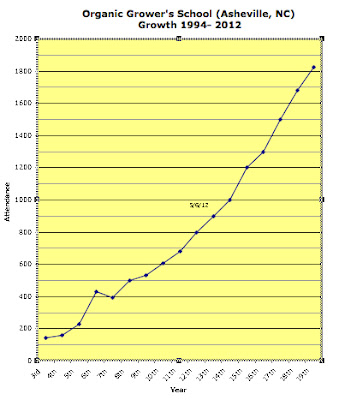As far as I can decipher, this workshop would cost $400, not including lodging and most meals .
John Jeavons is famous for dropping out of his corporate systems analyst work after Earth Day 1970 to apply the insights to farming, so as to get the most calories out of a patch of land. (Activist Bill Moyer followed a similar path with the American peace movement, and helped to transform it).
If anyone goes to this, I'd be interested in hearing what they learn.
-- Jim Barton
smithmillcreek.blogspot.com
**********************************************
Food and Our Future:
Hope and Solutions through Biointensive Farming
A Workshop with John Jeavons
October 23 through 25, 2008
8:00-5:00 in Dayton, Virginia:
Woodment of the World Hall
3045 John Wayland Hwy
http://www.johnjeavons.info/workshop-locations.html
http://www.sfgate.com/cgi-bin/article.cgi?file=/chronicle/archive/2002/04/13/HO126062.DTL
http://www.johnjeavons.info/register.html
All of life on Earth…depends on six-inches of topsoil and the fact that it rains!
The soil is a living organism that must be fed and nurtured to keep it feeding us. This
basic understanding is not a major focus of most current forms of conventional
agriculture. In this workshop John will share eight essential aspects of GROW
BIOINTENSIVE including: Deep Soil Preparation, Raised Beds, Composting, Intensive
Planting, Companion Planting, Carbon Farming, Calorie Farming, The Use of Open-
Pollinated Seeds, and A Whole-System Farming Method. John will also provide time for
questions and answers concerning northwest small-scale farming, long-term sustainable
soil fertility, and specific crops.
John Jeavons has directed Ecology Action’s Mini-Farming program since 1972.
He is the author of How to Grow More Vegetables, Fruits, Nuts, Berries, Grains
and Other Crops…, the textbook of the GROW BIOINTENSIVE (GB) Sustainable
Mini-Farming system, as well as being author, co-author and/or editor of over 30
other Ecology Action publications.
His major responsibilities include directing field
and library research and education in GB food raising. He advises biologically-
intensive projects in Mexico, Kenya, Ecuador, Russia, Uzbekistan and Afghanistan
as well as all corners of the U.S. Jeavons holds a B.A. in Political Science from
Yale University. Before coming to Ecology Action in 1971, he worked as a systems
analyst in business, government and university settings. He has received the Boise
Peace Quilt, Santa Fe Living Treasure, Giraffe, and Steward of Sustainable
Agriculture awards for public service.
Click Here to Read More..






